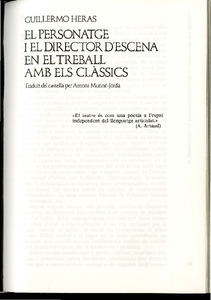El personatge i el director d'escena en el trebgall amb els clàssics
Metadatos
Mostrar el registro completo del ítem
Estudis escènics: quaderns de l'Institut del Teatre. 1986, Núm. 28
Tipo de documentoArtículo
Resumen
<p>The theatre cannot get free of its relationships with anthropology, semiology, psychoanalysis, audio-visuals, etc. The solution is not, despite the opinion of some producers, stagings which cost several millions of pesetas and mechanisms which create in the audience the idea of «practically» seeing a movie. There is no real character beyond a precise staging or the linguistic reading of a dramatic work. That is the reason why the producer should be considered the author of a performance. The most exciting enterprise for the producers of the 20th century is the reading of the classics. Jouvet, Taïrov, Craig, Meierhold, Artaud, Grotowski and Brecht have shown their interest in them. All civilized countries, except for Spain, are very interested in the classics. The concept of character is a crossroads which raises more questions than answers. Staging is a synthesis work and it does not make any sense to talk about a character as an imaginary being created only by -an author. Nowadays there are as many «characters» of the same «character» as stagings in the theatres of all over the world. The theatre should give dynamic answers to the complex social development.</p>
Condiciones de accesoAcceso abierto
ISSN2385-362X
,
0212-3819
Colecciones
- 1986: Núm.: 28 [9]


